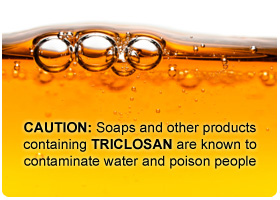06
Nov
NY State Senator Calls For Statewide Triclosan Ban
(Beyond Pesticides, November 6, 2015) New York State Senator Tim Kennedy (D-NY) has called for a statewide ban on triclosan, one of the most prevalent antibacterial compounds found in common household products. Minnesota is the only state to have passed a triclosan ban. If passed, the New York Bill (Bill S6070) would prohibit the sale of cleaning products containing triclosan, triclocarban, or derivatives of similar antibacterial compounds, and mark a clear victory for human health and safety interests within the state.
 Triclosan has been used for over 30 years in the U.S., mostly in a medical setting, but more recently in consumer products. Beyond Pesticides has generated extensive documentation of the potential human and environmental health effects of triclosan and its cousin triclocarban, called on manufacturers to stop using triclosan in its products and retailers to stop carrying these products, and previously petitioned the Environmental Protection Agency (EPA) for the cancellation of registered products that contain the antibacterial pesticide. In May 2015, EPA issued its long-awaited response to the Citizen Petition filed by Beyond Pesticides and Food & Water Watch, denying the request.
Triclosan has been used for over 30 years in the U.S., mostly in a medical setting, but more recently in consumer products. Beyond Pesticides has generated extensive documentation of the potential human and environmental health effects of triclosan and its cousin triclocarban, called on manufacturers to stop using triclosan in its products and retailers to stop carrying these products, and previously petitioned the Environmental Protection Agency (EPA) for the cancellation of registered products that contain the antibacterial pesticide. In May 2015, EPA issued its long-awaited response to the Citizen Petition filed by Beyond Pesticides and Food & Water Watch, denying the request.
When introduced to the market in 1972, triclosan was confined to hospital and health care settings. Since then, triclosan exploded onto the market place in hundreds of consumer products ranging from antibacterial soaps, deodorants, toothpastes, cosmetics, fabrics, toys, and other household and personal care products. Triclosan’s success on the consumer market has been aided by the false public perception that antibacterial products are best to protect and safeguard against potential harmful bacteria. Numerous reports have increasingly linked triclosan (and its chemical cousin triclocarban), to a range of adverse health and environmental effects from cancer and endocrine disruption, bacterial and compounded antibiotic resistance, to the contamination of water and its negative impact on fragile aquatic ecosystems. Data presented at the 248th National Meeting and Exposition of the American Chemical Society, the world’s largest scientific society, revealed that 100% of pregnant women in a multi-ethnic urban population in Brooklyn, New York tested positive for triclosan in their urine. In half of the pregnant women tested, the chemical also showed up in umbilical cord blood. A study published in 2010 by the University of Florida (UF) raised concerns about triclosan’s endocrine disrupting properties inhibiting proper fetal development.
Senator Kennedy’s legislation includes plans to get triclosan off of store shelves in New York to prevent further harm to public health and important ecosystems like the Great Lakes that border the state. “We need to protect our Great Lakes and water supplies for future generations,” Sen. Kennedy said. “We have an obligation to protect them.” Over 95% of the uses of triclosan are in consumer products that are disposed of in residential drains. As a result, widespread use of triclosan and other antibacterial compounds result in contamination of the nation’s waterways, with triclosan being the most prevalent contaminant not removed by typical wastewater treatment plants. In fact, triclosan has been detected in wastewater, activated sludge, surface water, and sediments. According to a U.S. Geological Survey study of 95 different organic wastewater contaminants in U.S. streams, triclosan was one of the most frequently detected compounds and at some of the highest concentrations. Brian Smith, associate executive director of Citizens Campaign for the Environment, joined Senator Kennedy in supporting the ban: “When we wash our hands or brush our teeth, we don’t expect we’re contributing toxic pollutants to our Great Lakes,” Smith said. “Clean hands and clean teeth don’t have to mean polluted water.”
In the past, public pressure, led by Beyond Pesticides and other groups, has contributed to growing awareness of the dangers of triclosan’s use. As a result, several major manufacturers have already taken steps to exclude the chemical, including Johnson & Johnson, Procter & Gamble and Colgate-Palmolive, which reformulated its popular line of liquid soaps, but continues to formulate Total ® toothpaste with triclosan. Minnesota became the first state to ban the toxic antibacterial, announcing that retailers would no longer be able to sell cleaning products that contain triclosan, effective January 2017. In June 2015, the agency responsible for chemical oversight in the European Union announced that the antibacterial pesticide, triclosan, is toxic and bioaccumulative, and will be phased-out for hygienic uses and replaced by more suitable alternatives. According to the European Chemicals Agency (ECHA), “[N]o safe use could be demonstrated for the proposed use of triclosan.”
Interested in taking steps to rid triclosan from your community? Here are a few things you can do. Encourage your local hospitals, schools, government agencies, and businesses to use their buying power to go triclosan-free, or follow the lead of Minnesota and New York by introducing a ban on triclosan. Additionally, organizations can adopt Beyond Pesticides’ model resolution which commits them to not procuring or using products containing triclosan. For additional information and resources on the human health and environmental effects of triclosan, join the ban triclosan campaign and sign the pledge to stop using triclosan today.
Source: The Buffalo News
All unattributed positions and opinions in this piece are those of Beyond Pesticides.











thank you for making me aware of Triclosan
November 6th, 2015 at 6:58 am